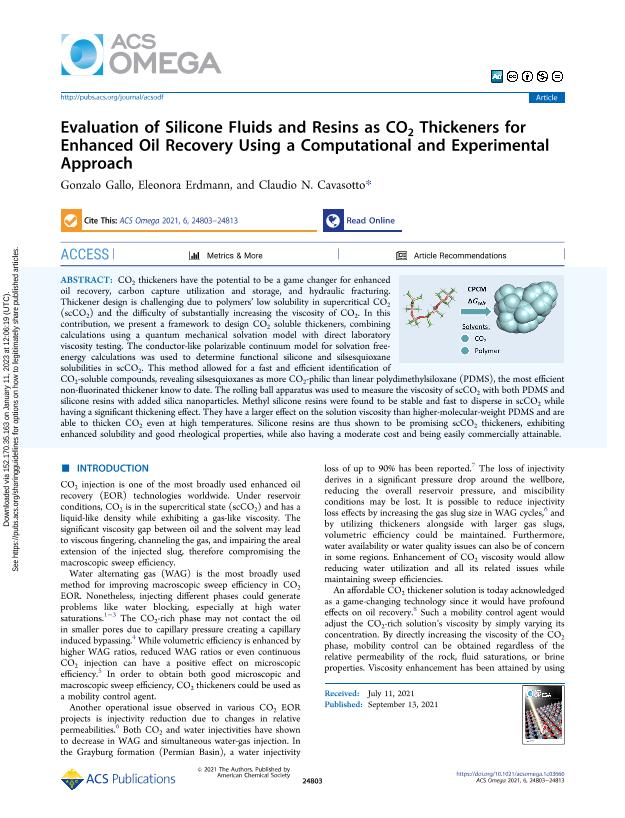Artículo
Evaluation of Silicone Fluids and Resins as CO2Thickeners for Enhanced Oil Recovery Using a Computational and Experimental Approach
Fecha de publicación:
09/2021
Editorial:
American Chemical Society
Revista:
ACS Omega
ISSN:
2470-1343
Idioma:
Inglés
Tipo de recurso:
Artículo publicado
Clasificación temática:
Resumen
CO2thickeners have the potential to be a game changer for enhanced oil recovery, carbon capture utilization and storage, and hydraulic fracturing. Thickener design is challenging due to polymers’ low solubility in supercritical CO2(scCO2) and the difficulty of substantially increasing the viscosity of CO2. In this contribution, we present a framework to design CO2soluble thickeners, combining calculations using a quantum mechanical solvation model with direct laboratory viscosity testing. The conductor-like polarizable continuum model for solvation free-energy calculations was used to determine functional silicone and silsesquioxane solubilities in scCO2. This method allowed for a fast and efficient identification of CO2-soluble compounds, revealing silsesquioxanes as more CO2-philic than linear polydimethylsiloxane (PDMS), the most efficient non-fluorinated thickener know to date. The rolling ball apparatus was used to measure the viscosity of scCO2with both PDMS and silicone resins with added silica nanoparticles. Methyl silicone resins were found to be stable and fast to disperse in scCO2while having a significant thickening effect. They have a larger effect on the solution viscosity than higher-molecular-weight PDMS and are able to thicken CO2even at high temperatures. Silicone resins are thus shown to be promising scCO2thickeners, exhibiting enhanced solubility and good rheological properties, while also having a moderate cost and being easily commercially attainable.
Palabras clave:
ENHANCED OIL RECOVERY
,
RESINS
,
CO2 THICKENERS
Archivos asociados
Licencia
Identificadores
Colecciones
Articulos(IIMT)
Articulos de INSTITUTO DE INVESTIGACIONES EN MEDICINA TRASLACIONAL
Articulos de INSTITUTO DE INVESTIGACIONES EN MEDICINA TRASLACIONAL
Articulos(INIQUI)
Articulos de INST.DE INVEST.PARA LA INDUSTRIA QUIMICA (I)
Articulos de INST.DE INVEST.PARA LA INDUSTRIA QUIMICA (I)
Citación
Gallo, Gonzalo; Erdmann, Eleonora; Cavasotto, Claudio Norberto; Evaluation of Silicone Fluids and Resins as CO2Thickeners for Enhanced Oil Recovery Using a Computational and Experimental Approach; American Chemical Society; ACS Omega; 6; 38; 9-2021; 24803-24813
Compartir
Altmétricas




